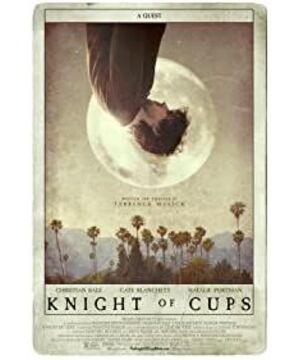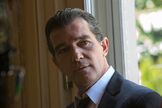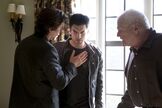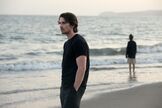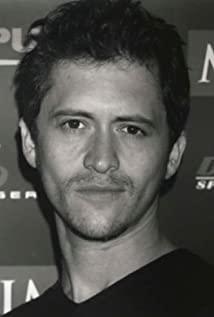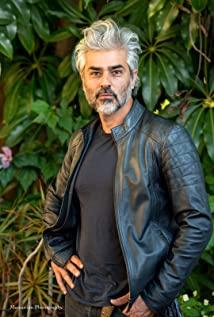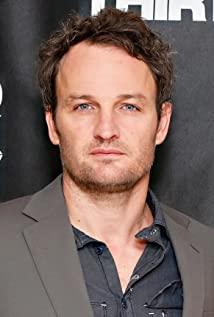"Knight of the Holy Grail" shows the confusion of people who have lost themselves, and the process of trying to find themselves and find their own existence.
The whole film has no climax, or even an obvious chronological sequence. It deliberately makes the audience feel disconnected, confused, meaningless and fatalistic . Sometimes the camera shoots people’s faces very closely; sometimes keeps a distance and moves at the same time, drifting around the character; sometimes it is suddenly attracted by water, palm trees or the place where the character’s eyes are; Shoot the light of the horizon. The whispering narration is interspersed throughout the film. The audience listened to the characters' subjective and abstract confessions about people, things, and things, and saw that they were working, at parties, having sex, and wandering aimlessly, as if they were there and not.
Terrence Malik is based on the chapter named after the Tarot card, combining the protagonist Rick and other characters (brother, father, ex-wife, women of various colors, etc.) interweaving fragments of separation and reunion, and combining them with countless fragmented and metaphorical fragments of life. Together, they construct a non-linear narrative structure—characters come and go, stop and go; Rick is half-asleep and half-awake, with good times and bad times; everything seems familiar, repeating itself, as if cursed and abandoned. In some kind of cycle. When the audience tried to interpret what happened between Rick and other characters, the seemingly unrelated segment suddenly cut in, interrupting the audience's thinking; when the audience was confused by the meaning of one of the segments, the picture was cut away again .
Is it imagination? Flashback? Or is it a metaphor?
It seems that the chaotic and disorderly arrangement allows the audience to go through the process of "from constantly searching for meaning; to questioning the act of'searching'; then getting lost in the movie, or being surprised or speechless; finally, embarking on the path of searching again"— —This is what Rick experienced.
There is a passage in Soren Kelgukker’s " The Sickness Unto Death ":
"But in spite of the fact that a man has become fantastic in this fashion, he may nevertheless (although most commonly it becomes manifest) be perfectly well able to live on, to be a man, as it seems, to occupy himself with temporal things, get married, beget children, win honor and esteem - and perhaps no one notices that in a deeper sense he lacks a self. About such a thing as that not much fuss is made in the world; for a self is the thing the world is least apt to inquire about, and the thing of all things the most dangerous for a man to let people notice that he has it. The greatest danger, that of losing one's own self, may pass off as quietly as if it were nothing; every other loss, that of an arm, a leg, five dollars, a wife, etc, is sure to be noticed.
(I don’t have a background in philosophy, and I am purely interested in reading Kierguokker and I am not fluent in Danish. Regarding the translation of this passage, I have referred to the "Kierguokker Collection" published by China Social Sciences Press. In contrast, the English translation I read first is closer to my expression here, so I chose to quote the English translation after weighing it. When I talk about this passage below, the translation comes from me.)
What Malik wants to express is exactly as Kergokaier wrote: a person who lacks himself, even if he is often in a state of detachment and despair, he can still-on the surface-live a normal life and devote himself to various things. (Marriage, childbirth, work, etc.). Almost no one will notice that this person is missing himself at a deeper level. The absence of self is the most dangerous. It happens so imperceptibly that it seems like nothing has happened. Kierguokker subtly cited "missing arms and legs", "lost five dollars" and "wife ran away" as examples. Compared with "lost self", he emphasized the concealment of the latter-quite "Existentialism" is the same as this movie.
Rick is the person who lost himself unknowingly in Kier Gokker's works. He didn't realize it at first. Various signs (earthquake, tarot card divination, house robbery, etc.) made him gradually wake up from his "sleeping" and began a journey of "searching". The relationship with women accounted for most of his journey: he met her; he cruised around with her, and then made friends; she was puzzled by the relationship between the two and felt powerless; he remained silent and noncommittal; he returned to celibacy . Perhaps the recurring scenes of Rick wandering in the desert symbolize his searching up and down while he is lost; women of all colors are like mirages in the desert-they come and go, but he never finds what he wants.
At the end of the film, Rick, who is living with his wife and children and living a wealthy life, does not seem to be so immersed in detachment and despair. Did he find himself? At this time, the desert appeared again. Rick faced the rock slope and slowly climbed up. Under the shining light of the sun that the dark clouds can't hide, he set off again and galloped on the road. Although he was still in the loop and still not free, he was like the happy Sisyphus described by Albert Camus. Facing the light, Rick said, "Begin."
View more about Knight of Cups reviews


